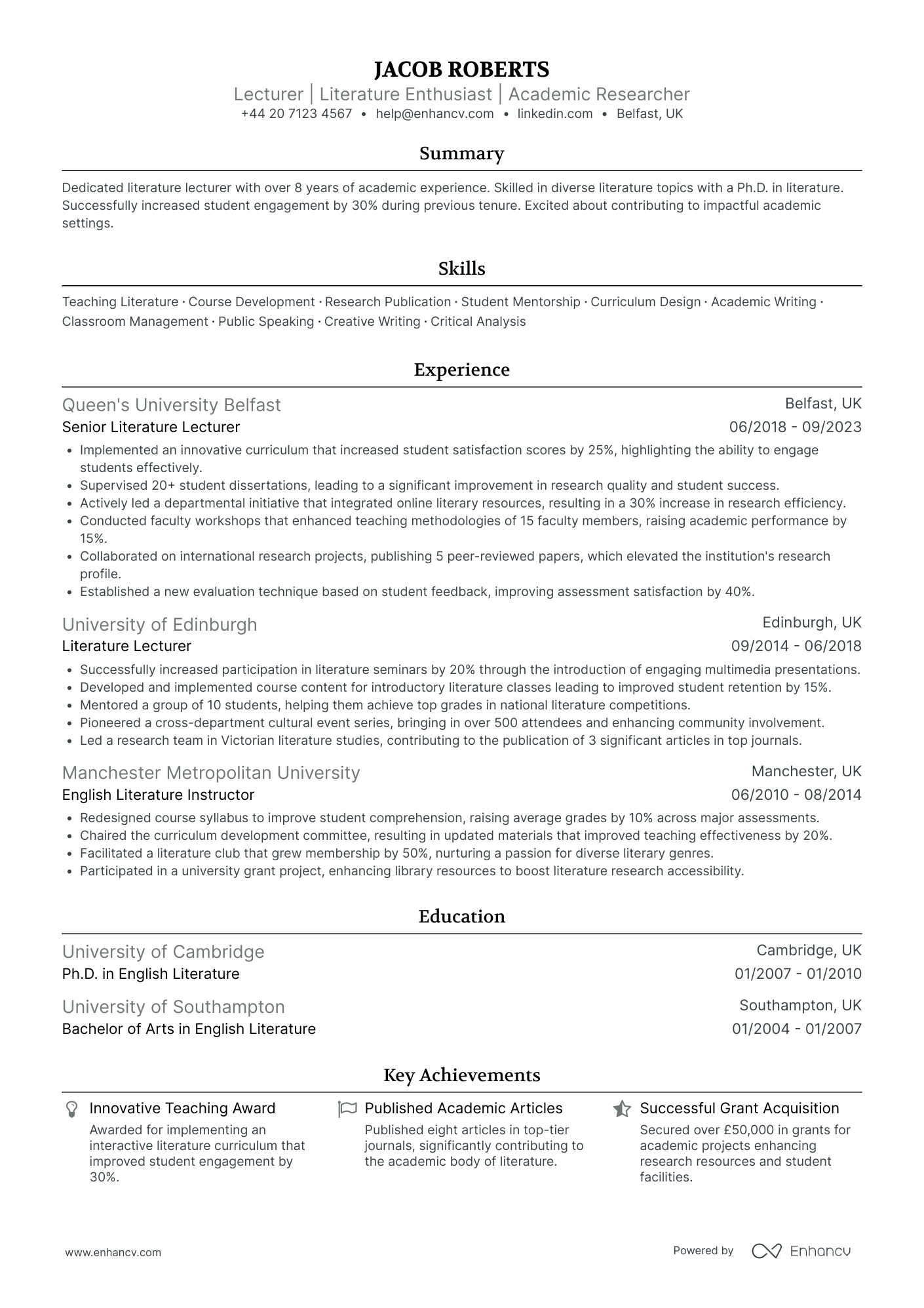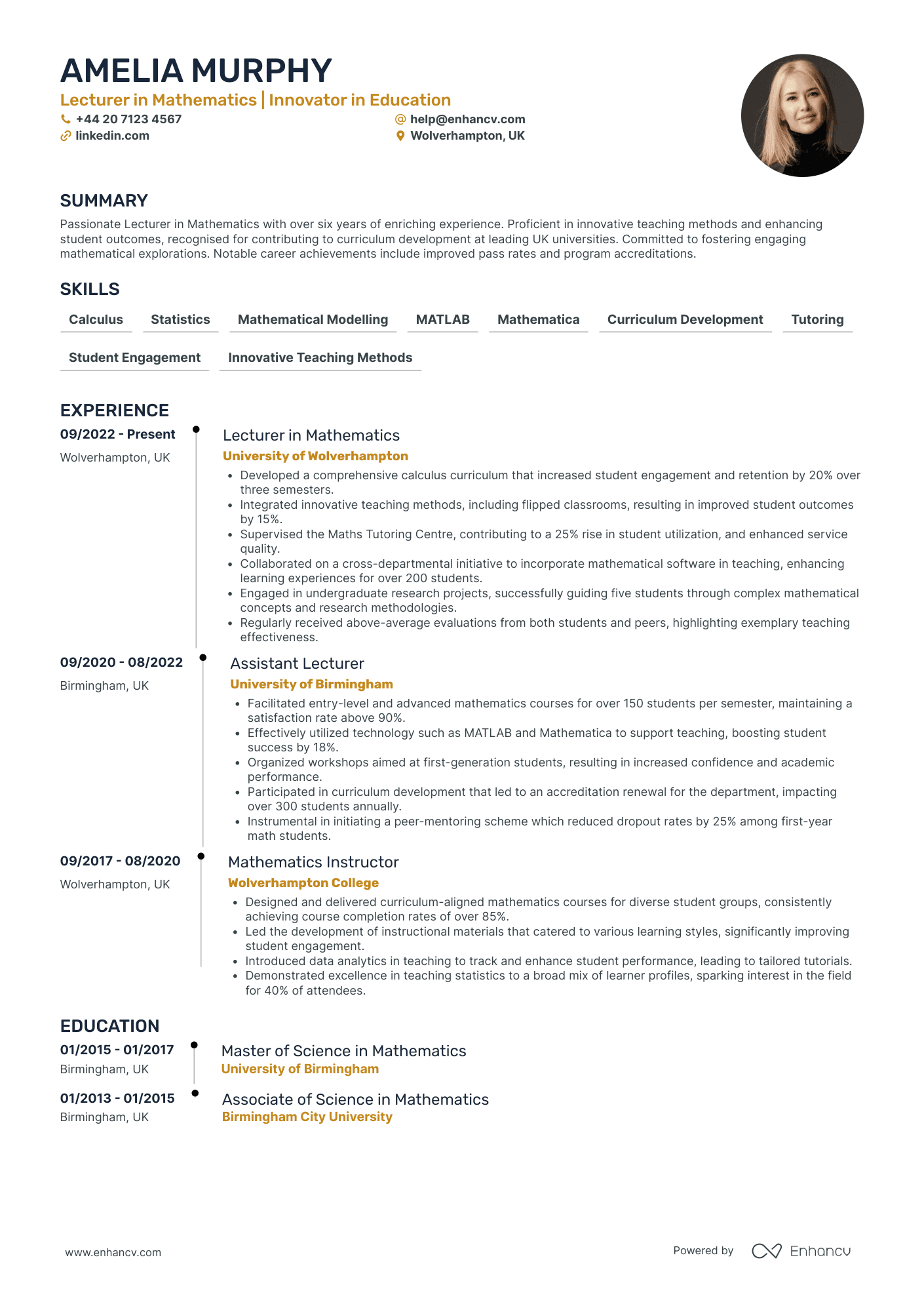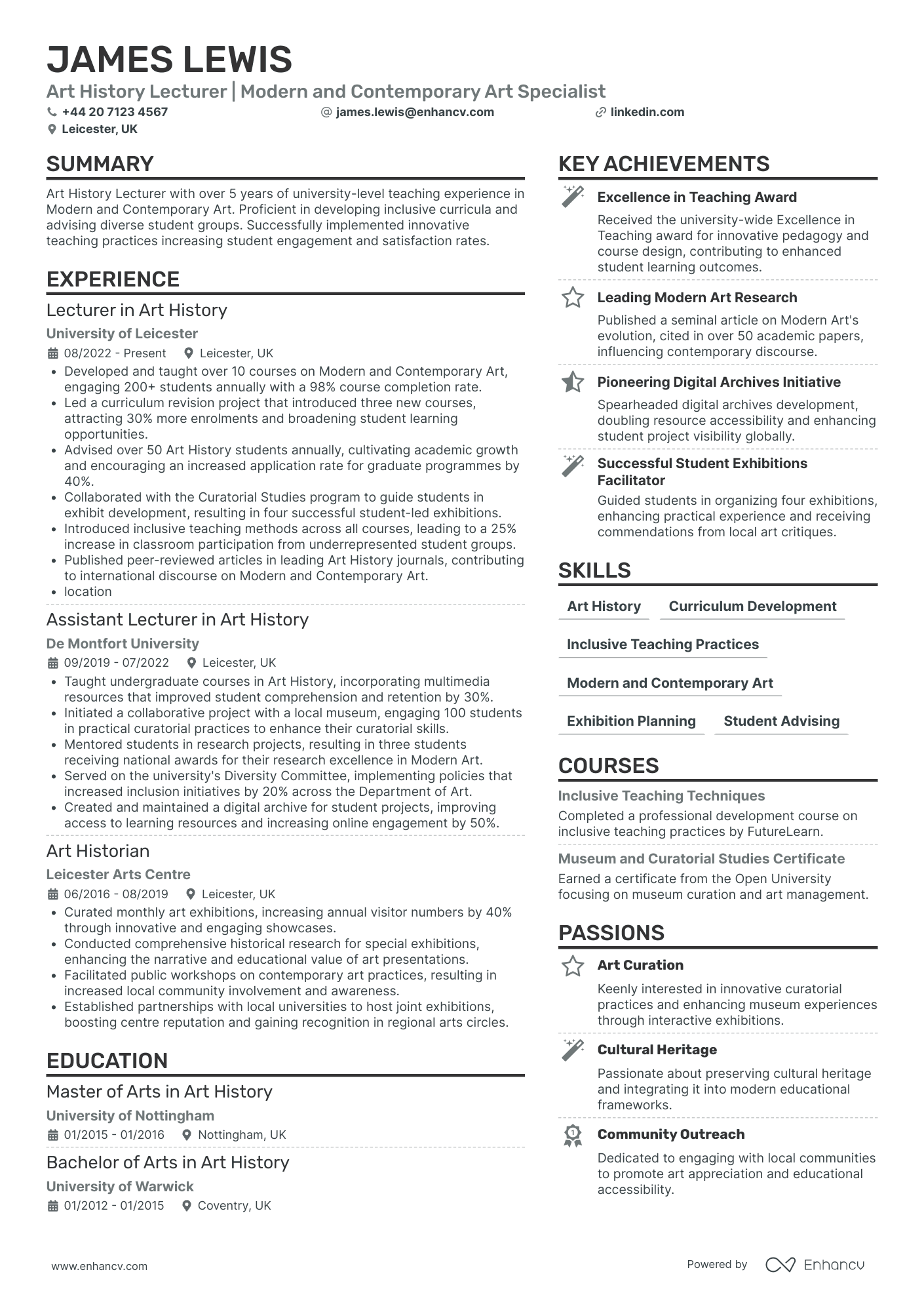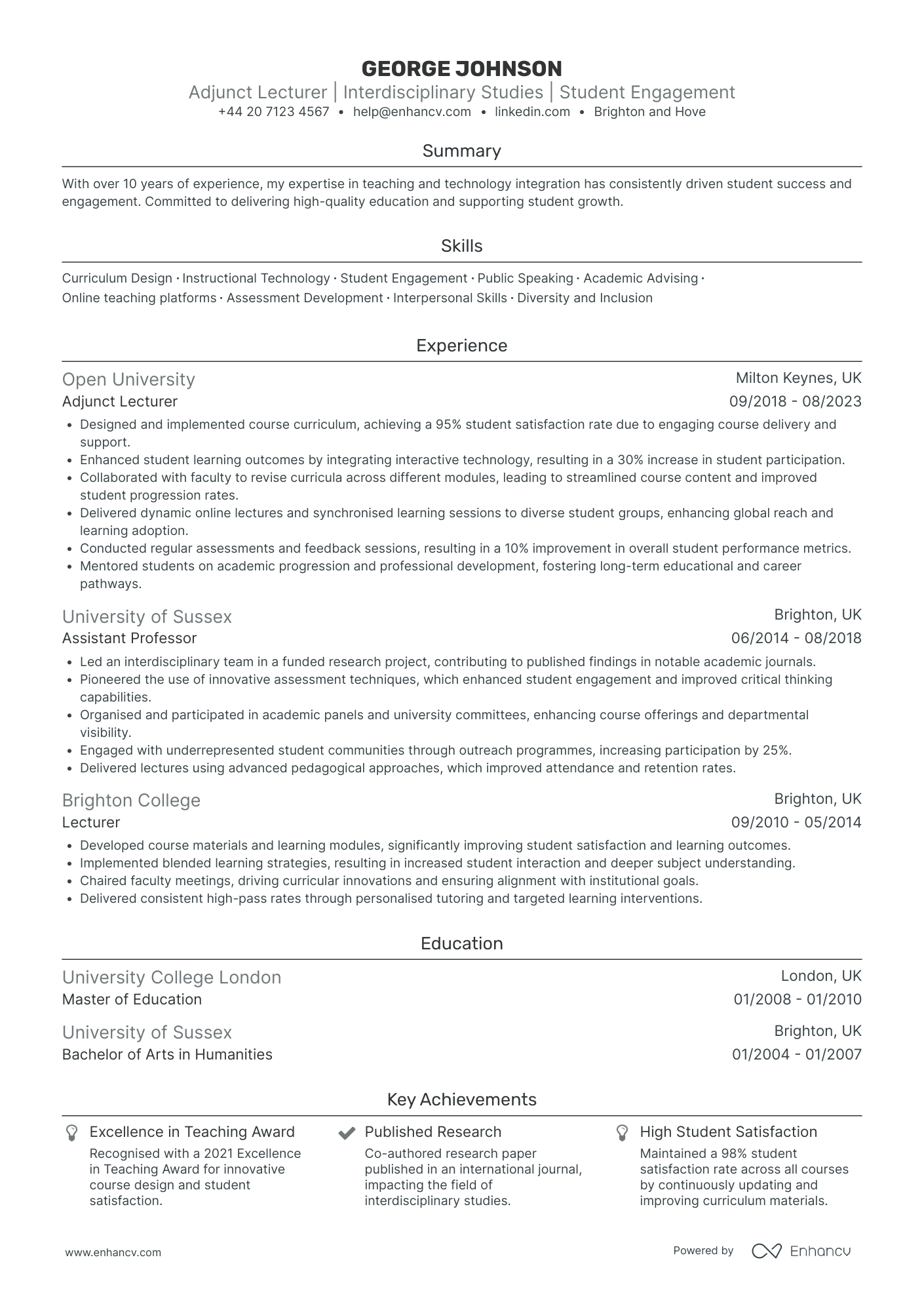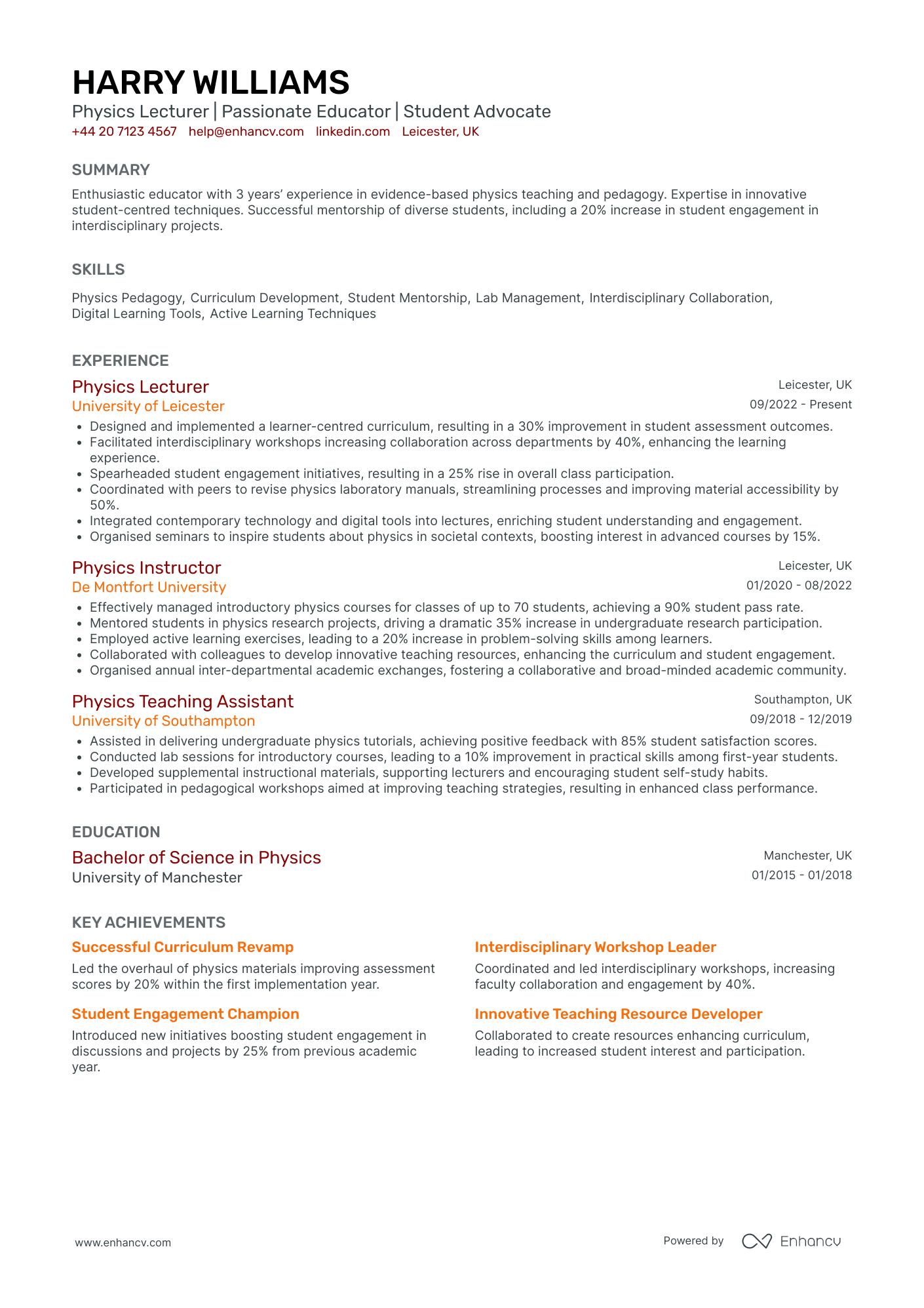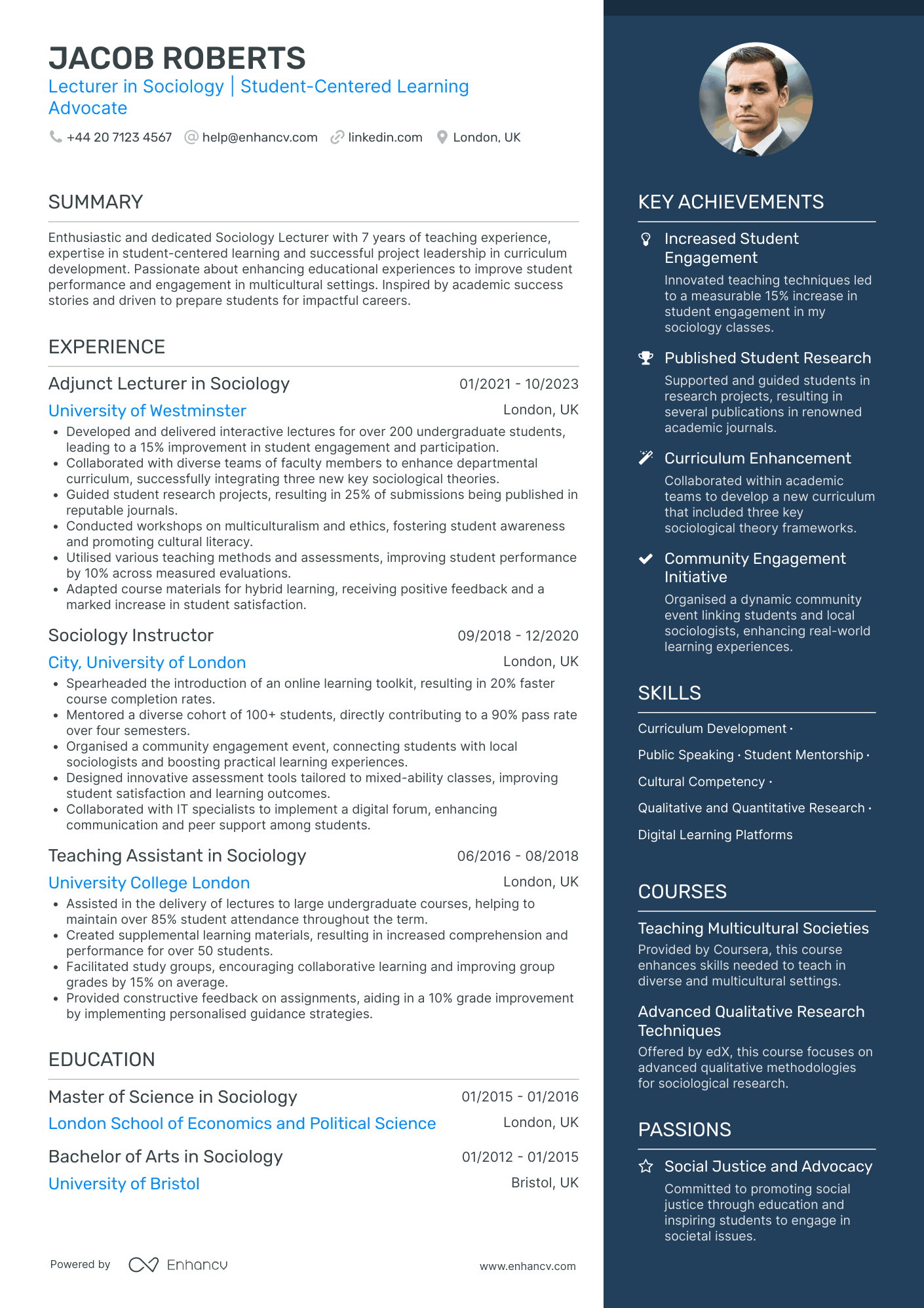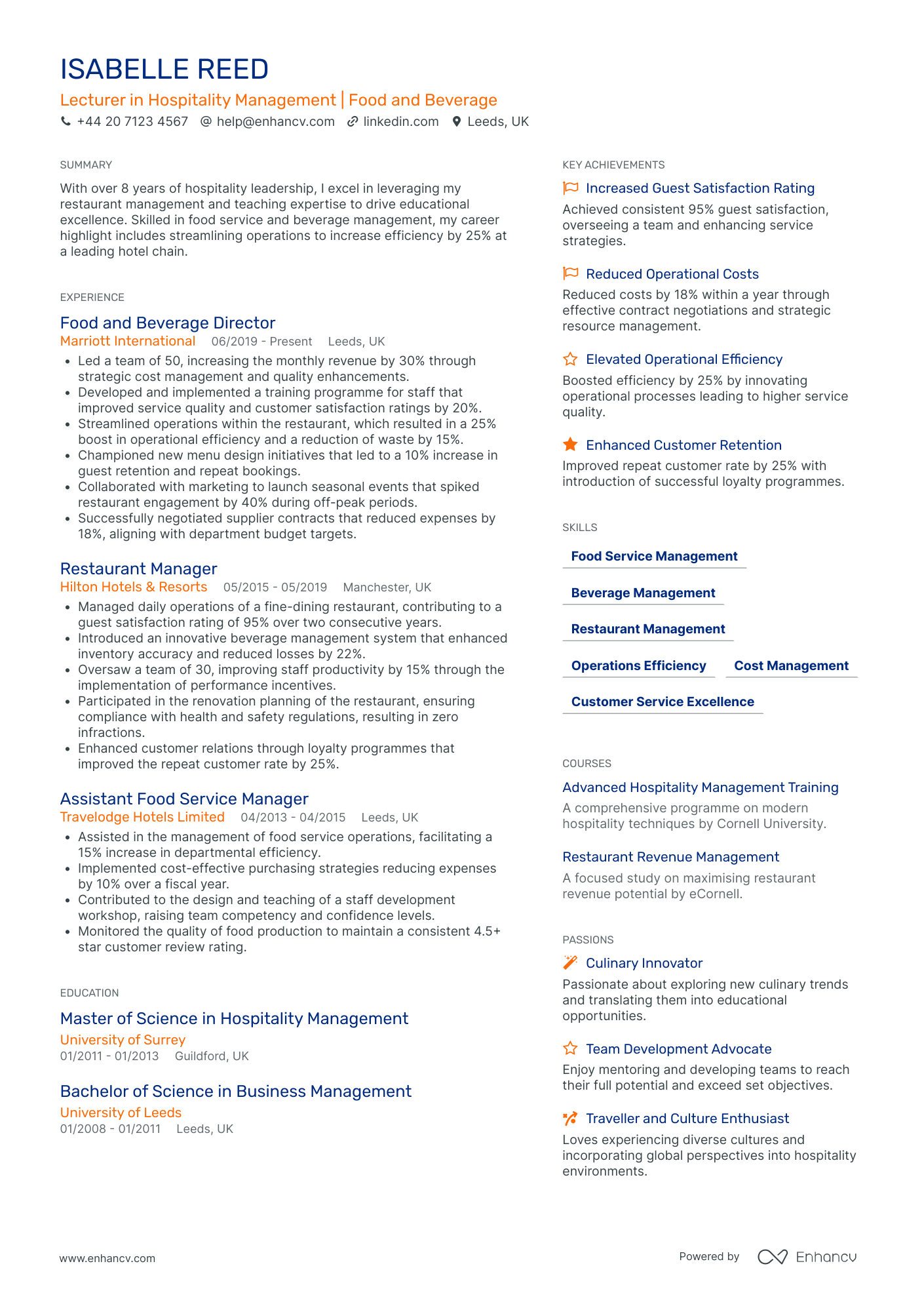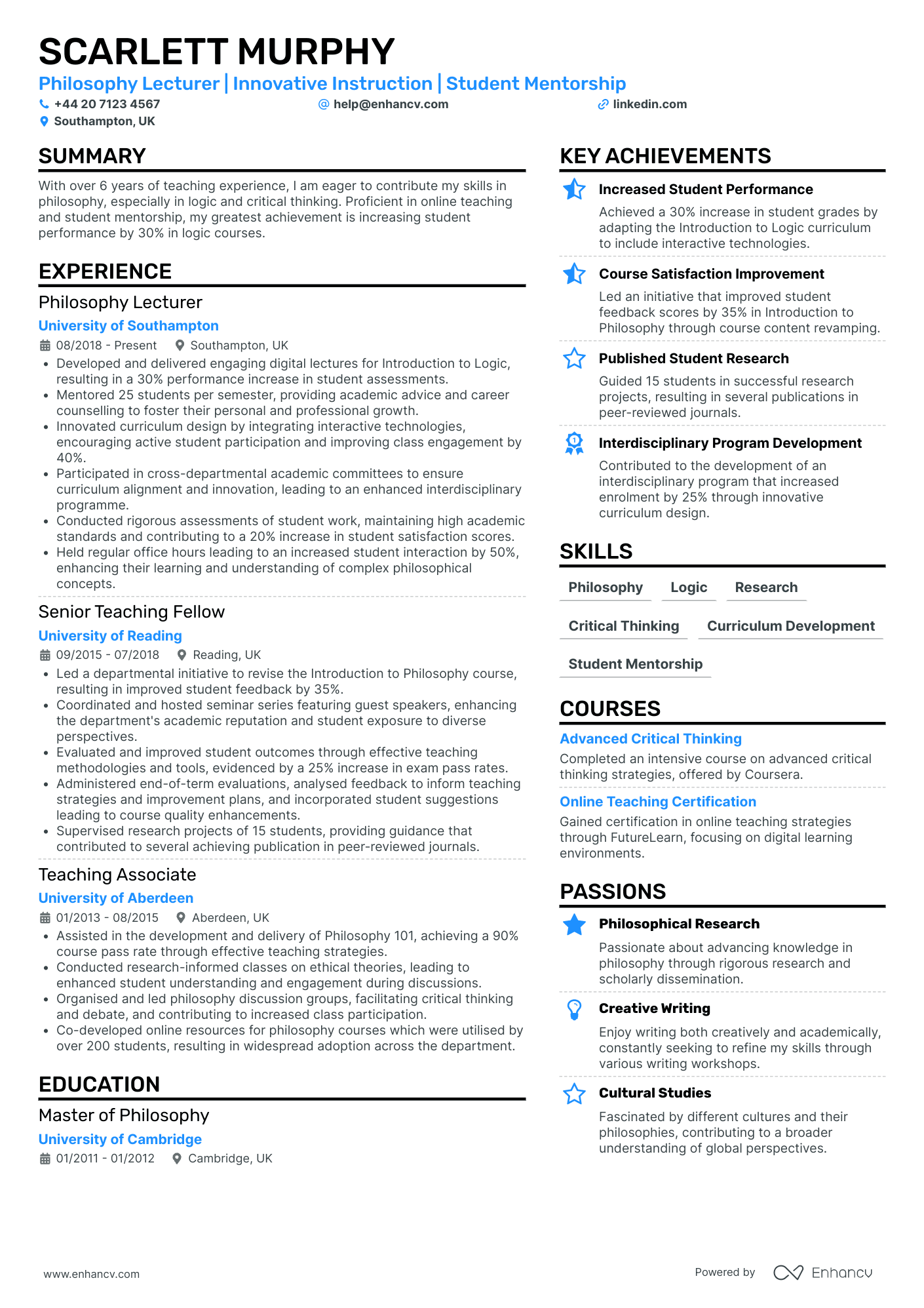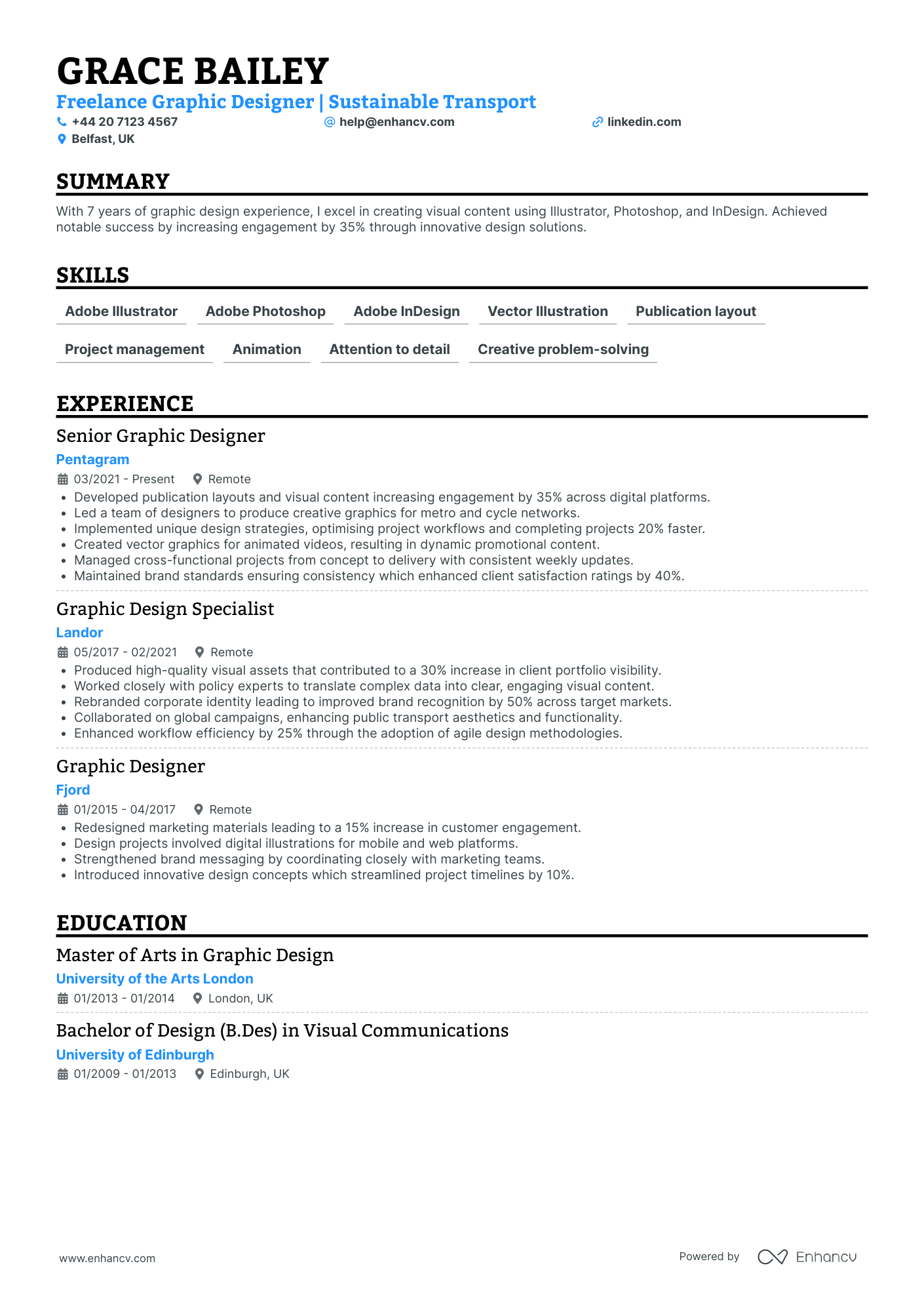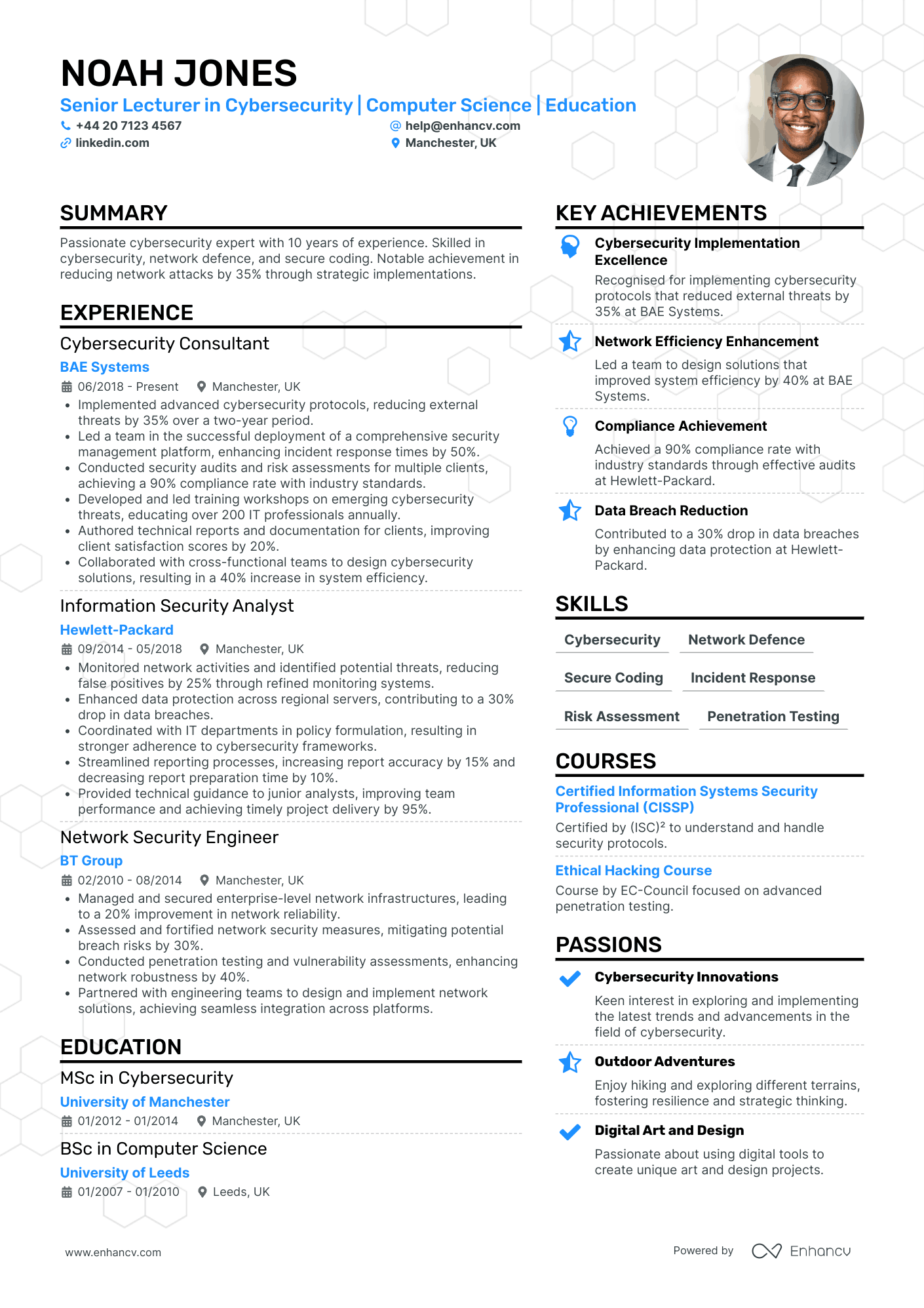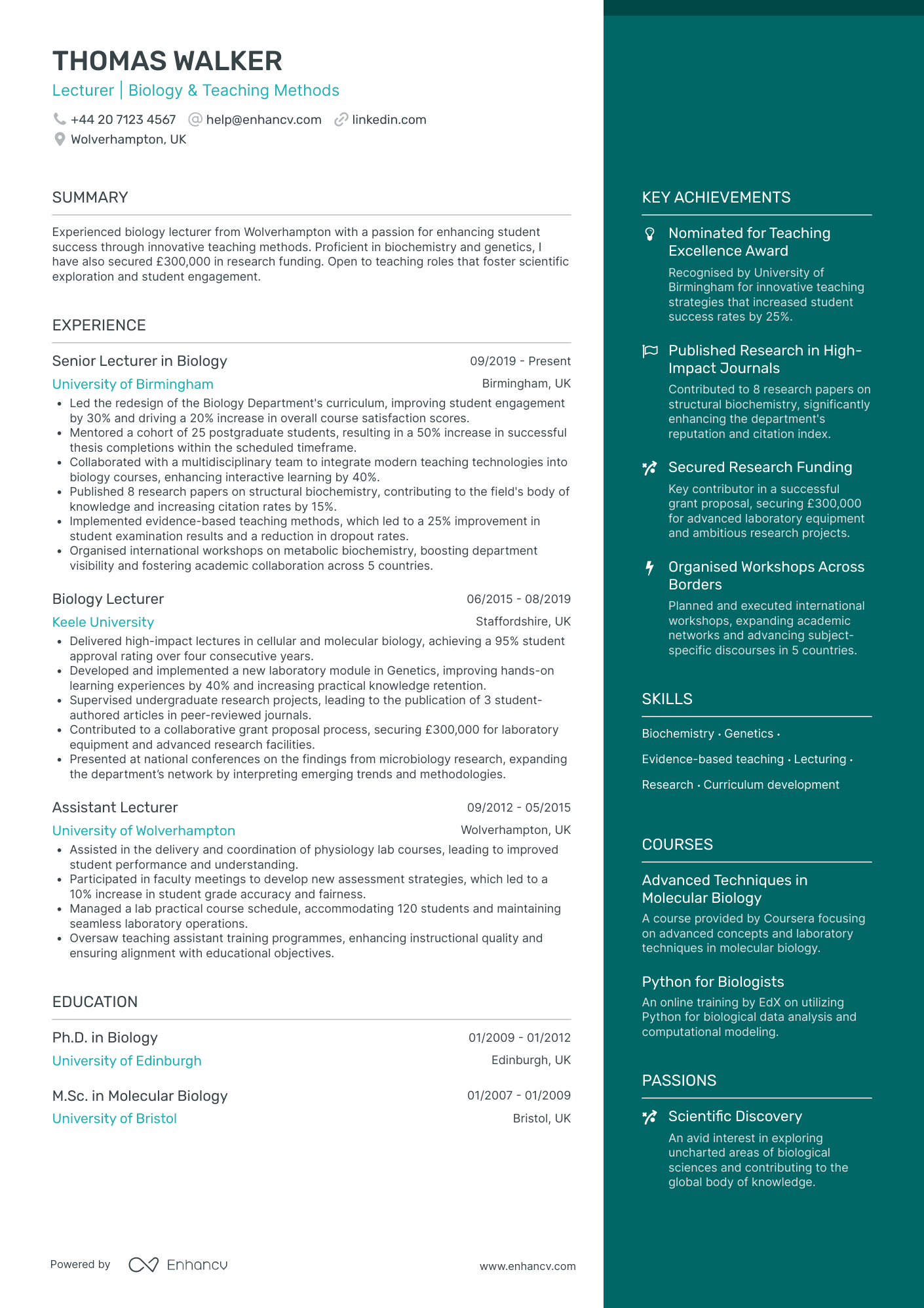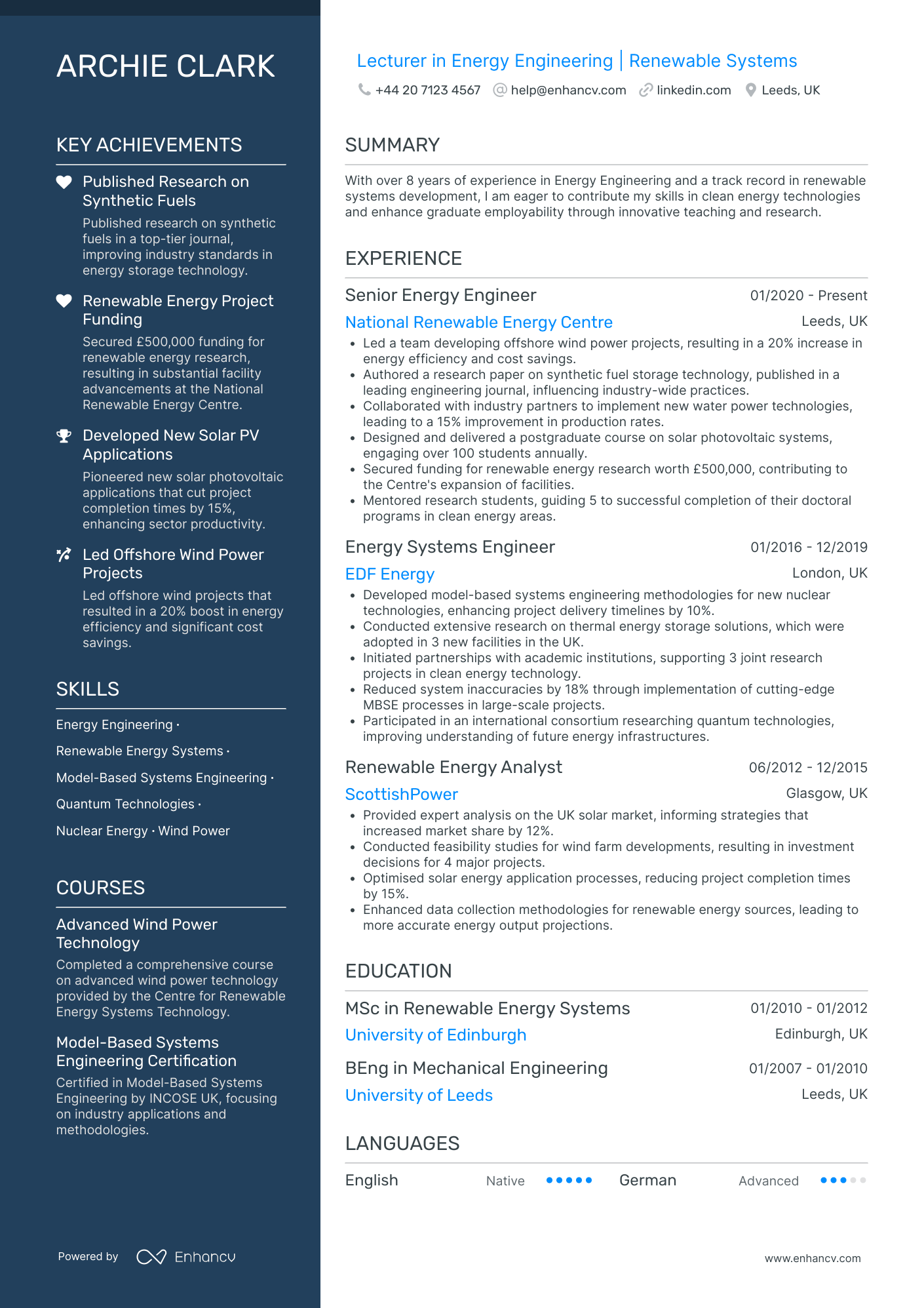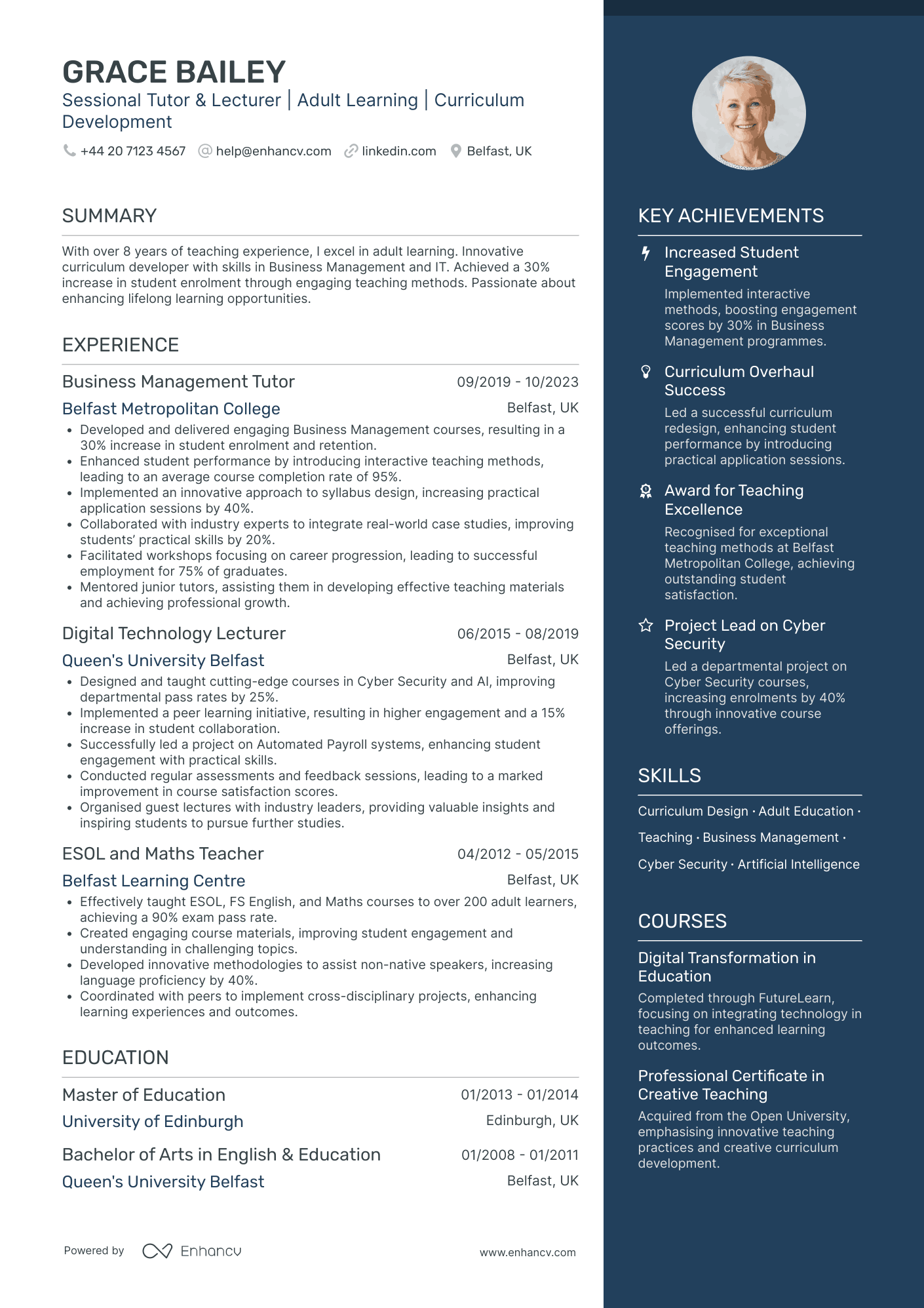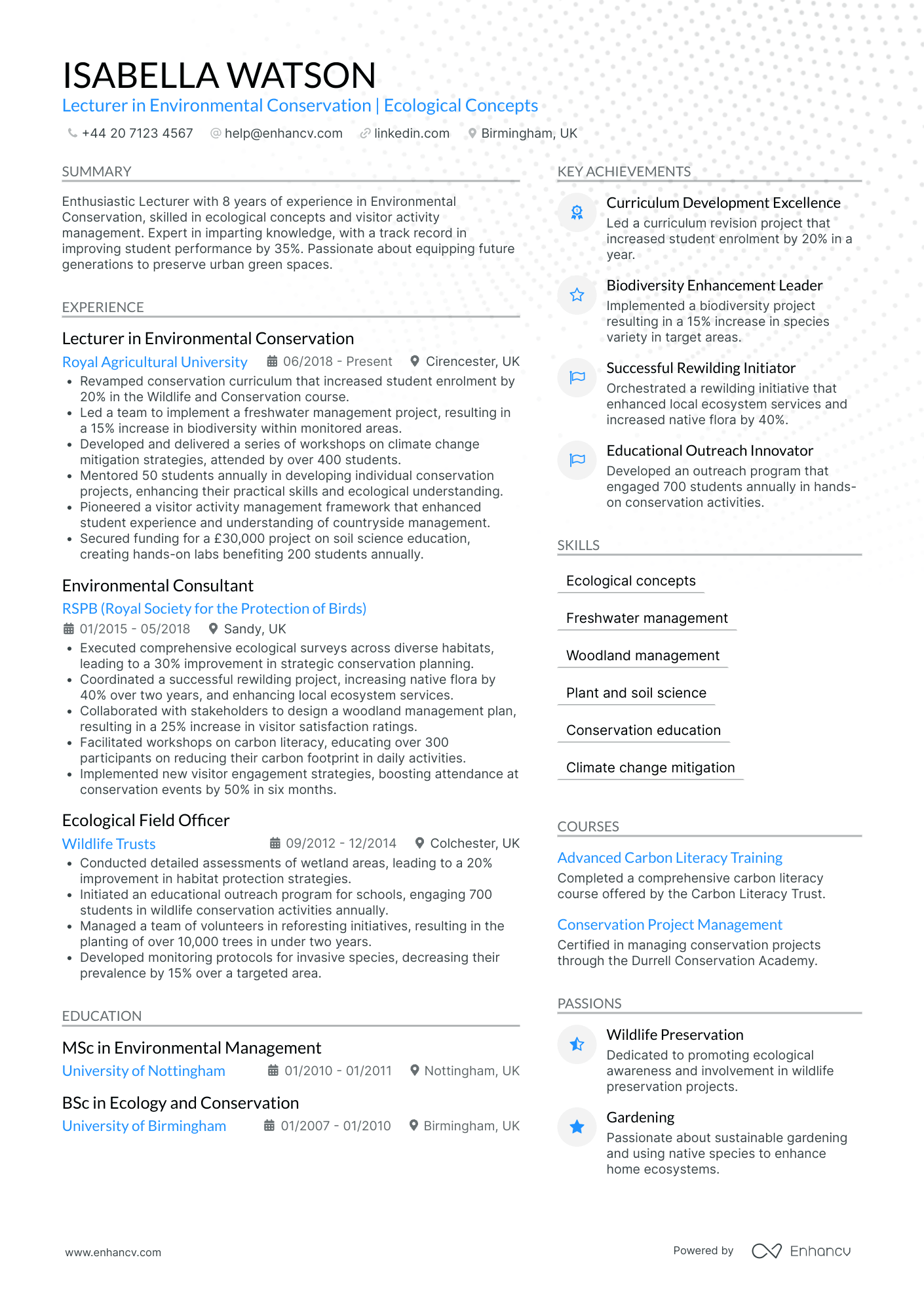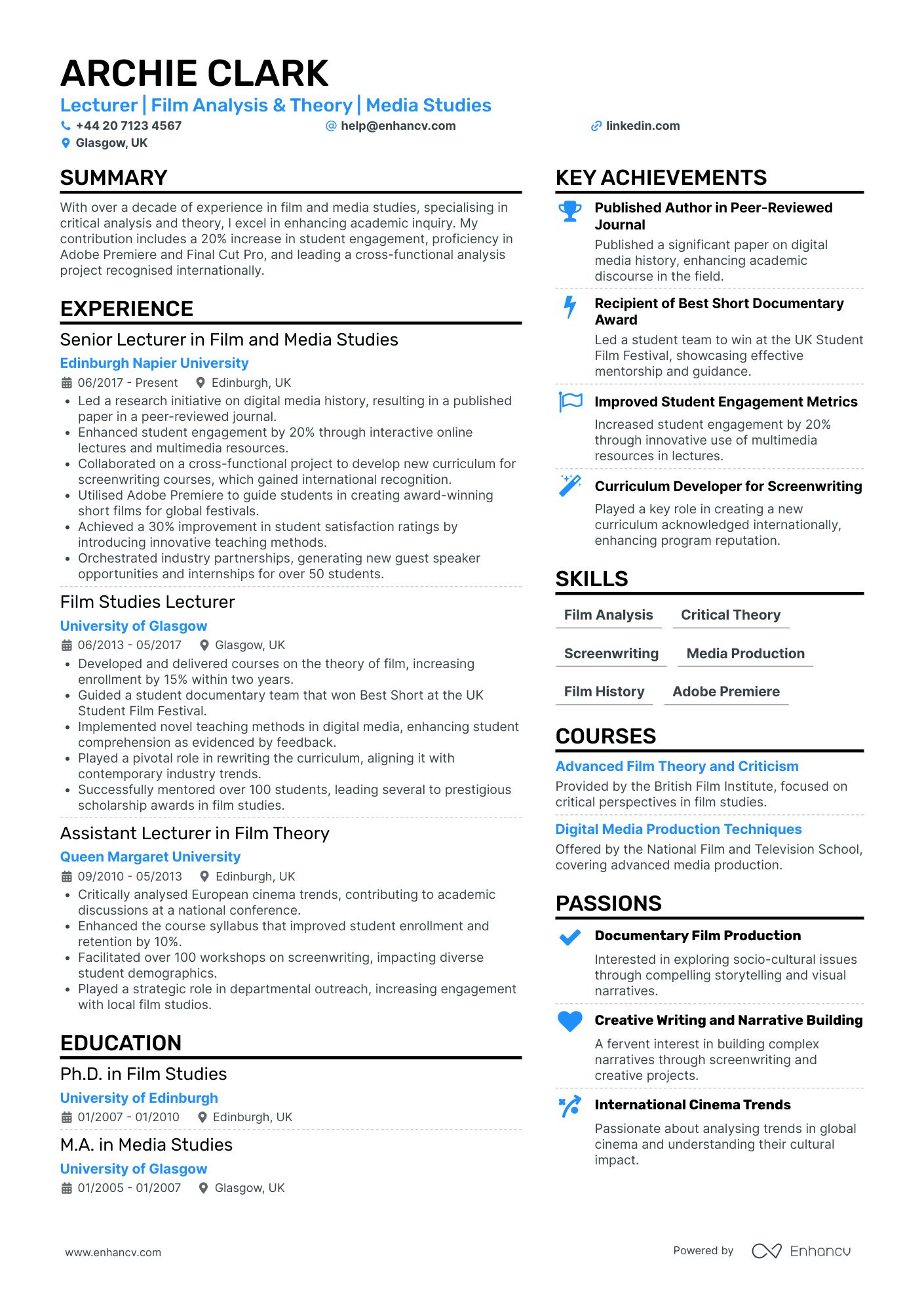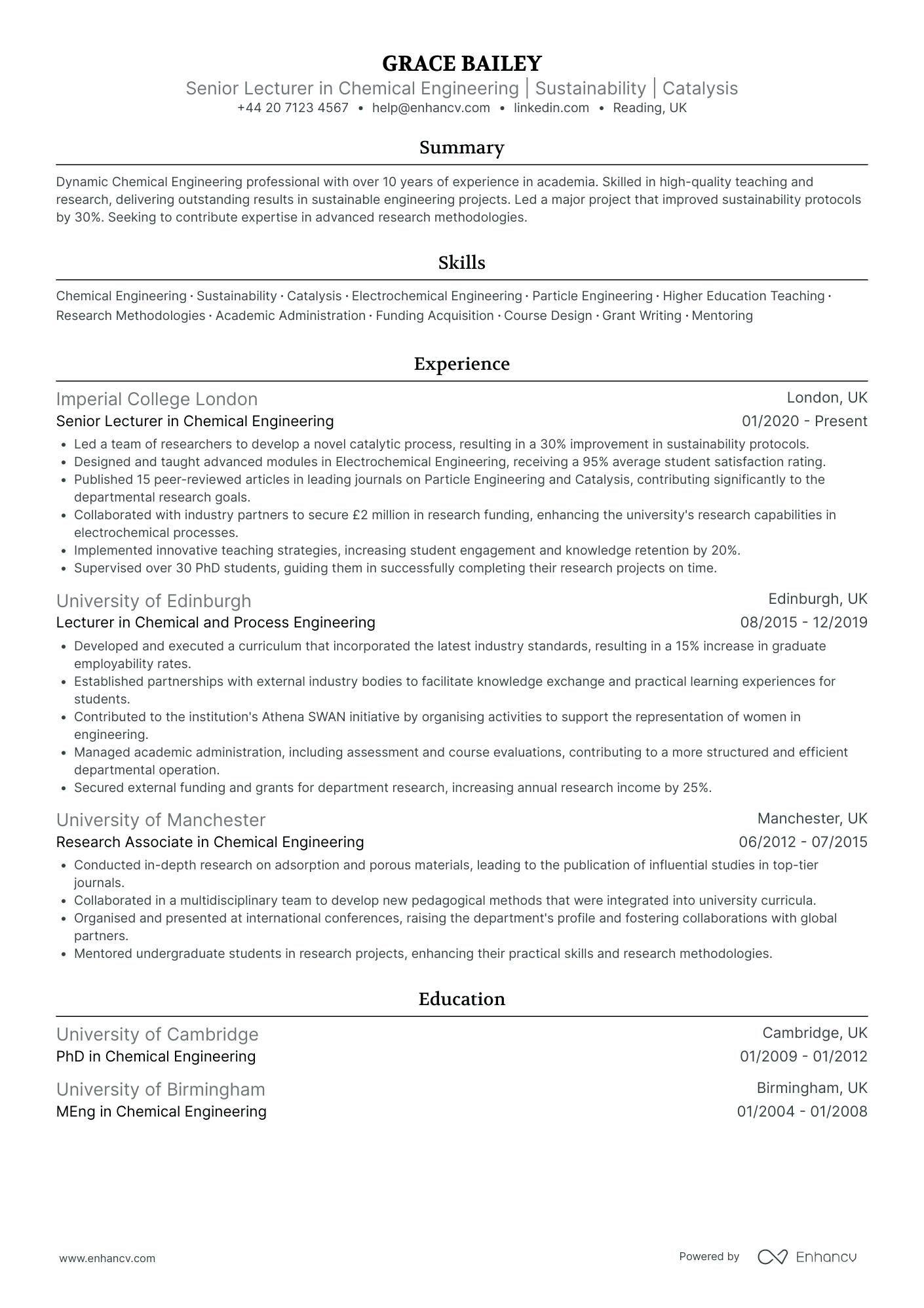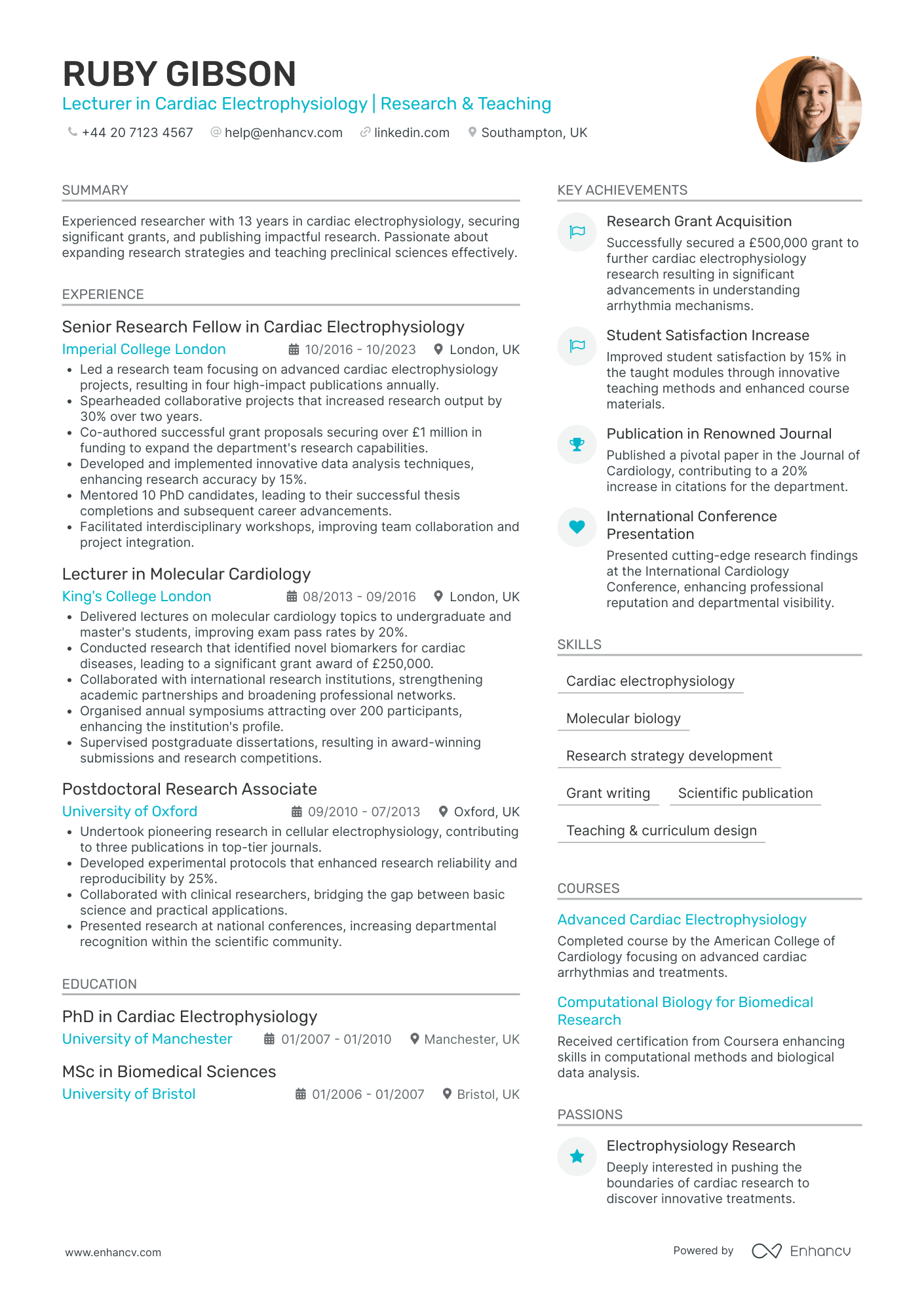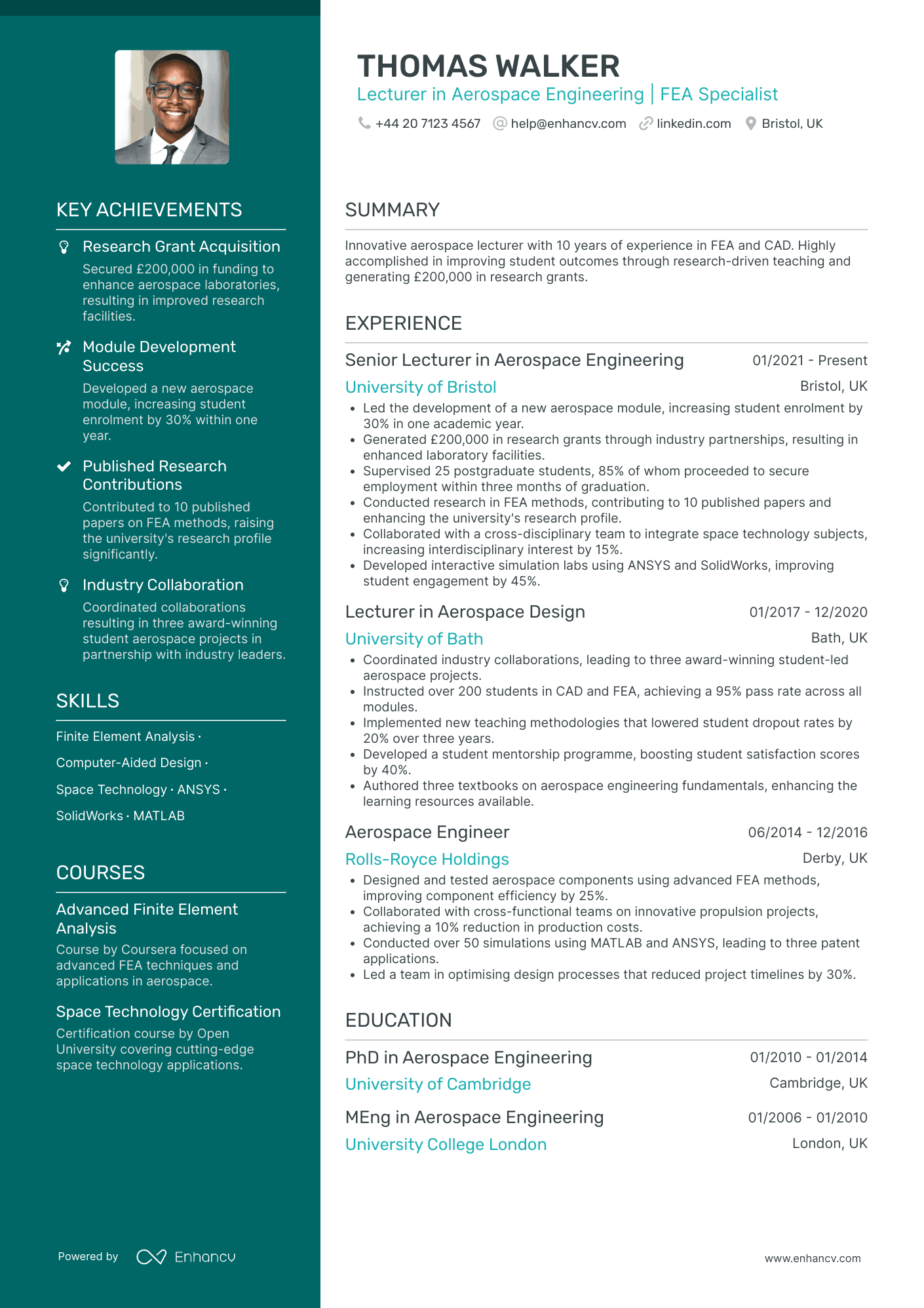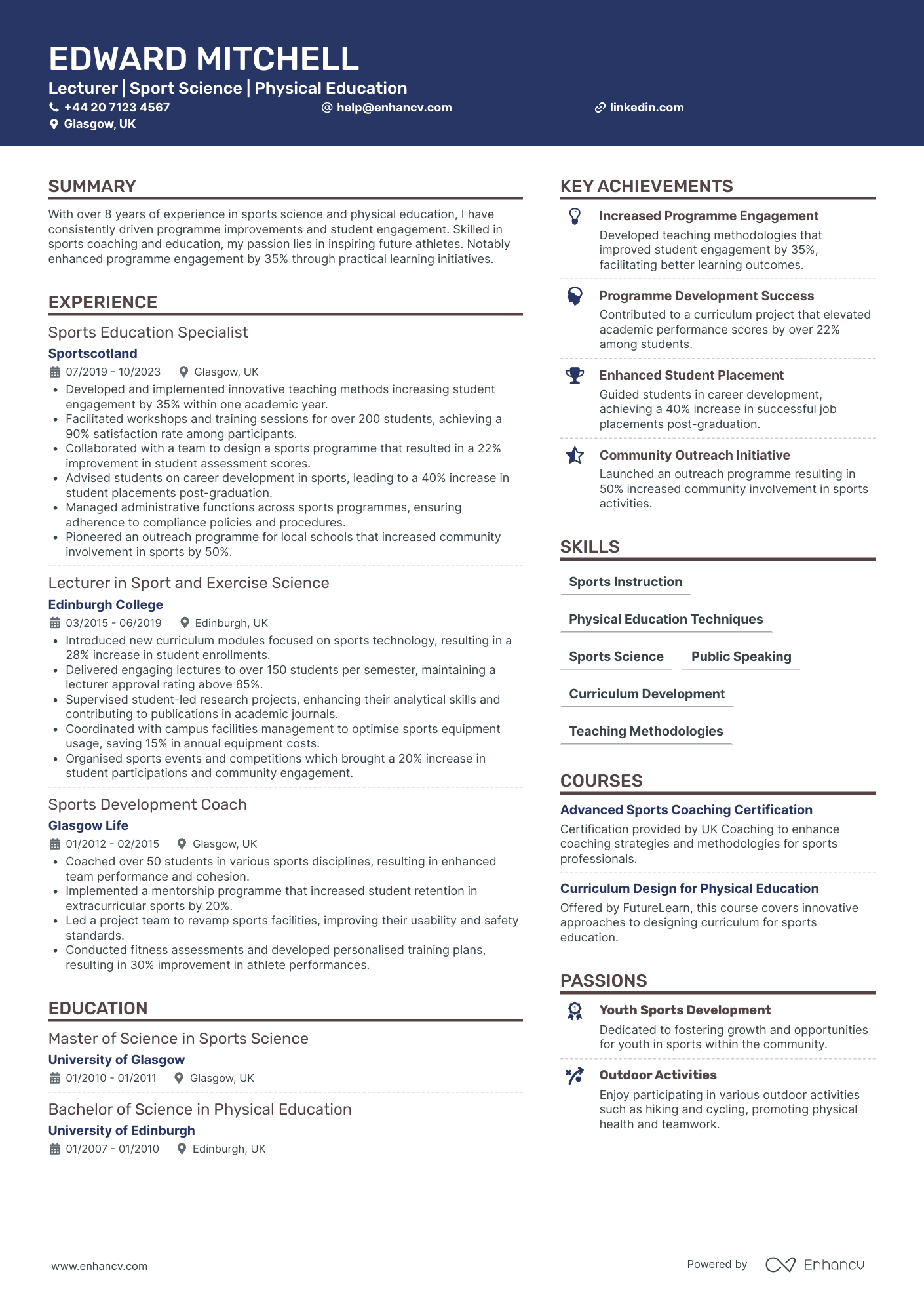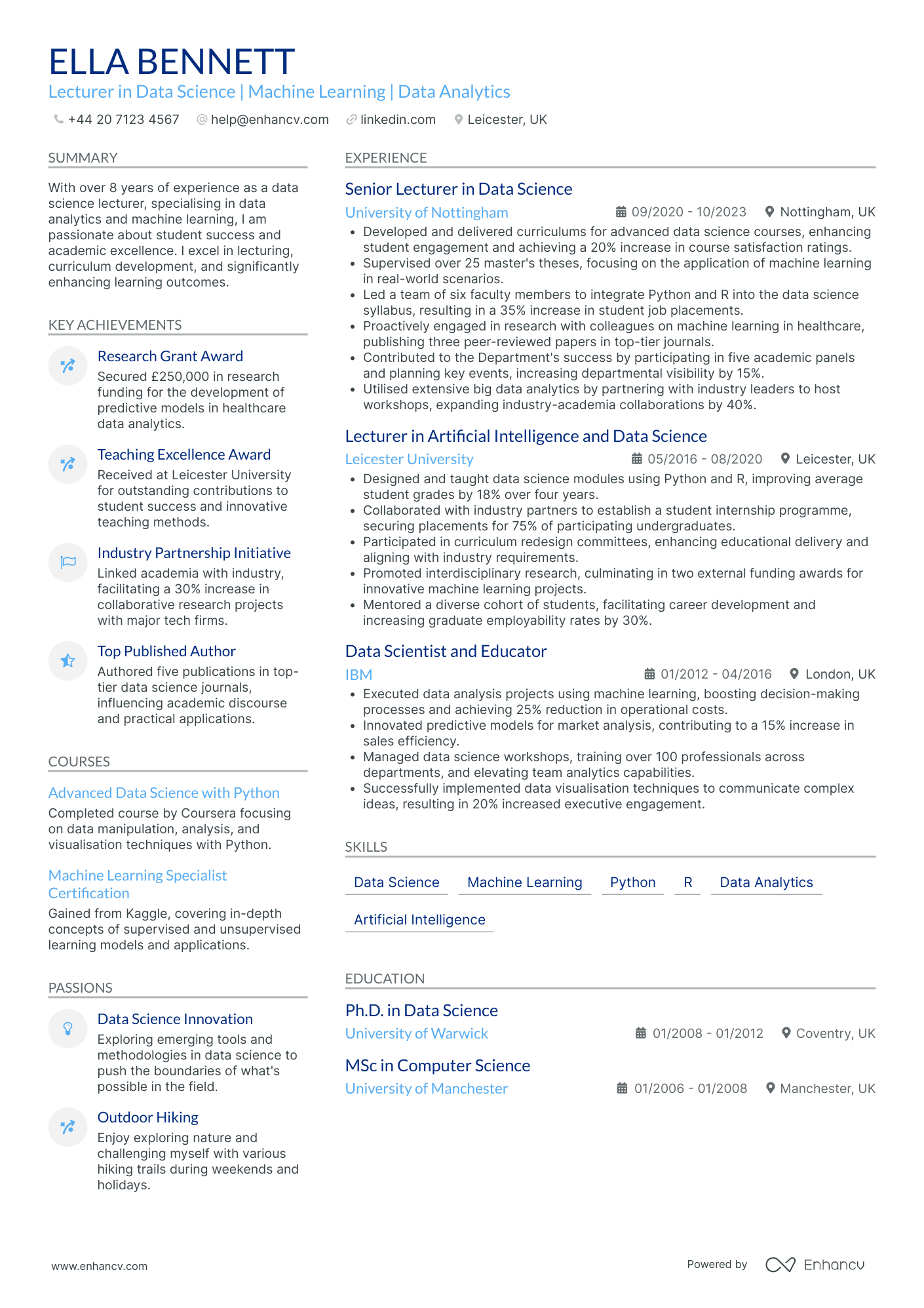One specific CV challenge you may face is articulating the breadth of your academic contributions and teaching experience effectively. Our comprehensive guide provides clear, structured advice to help you distil your professional journey into a compelling narrative, ensuring your CV stands out in a crowded academic job market.
- Applying the simplest CV design, so that recruiters can easily understand your expertise, skills, and professional background;
- Ensuring you stand out with your header, summary or objective statement, and a designated skills section;
- Creating your CV experience section - no matter how much expertise you have;
- Using real life professional CV examples to enhance the structure and outline of your profile.
If you still have no muse to write your professional CV, find some more industry-leading examples.
CV examples for lecturer
By Experience
Part-Time Lecturer in English Literature
- Structured for clarity and impact - The CV is well-organized into clear sections such as experience, education, and skills, making it easy to navigate and quickly identify relevant qualifications. It utilizes concise bullet points, ensuring that complex achievements are communicated effectively without overwhelming the reader.
- Evidence of career progression - Jacob Roberts demonstrates a consistent upward trajectory in academia, progressing from an English Literature Instructor to a Senior Literature Lecturer. His career path showcases growth and increasingly complex roles, aligning with his goals as an academic researcher and lecturer.
- Integration of leadership skills - The CV highlights Jacob's leadership qualities, not only in his roles such as supervising dissertations and leading research teams but also in his ability to engage and mentor students and colleagues, fostering an environment of academic excellence and collaboration.
Associate Lecturer in Mathematics
- Content Presentation and Structure - The CV is crafted with clear headers and sections that ensure easy navigation. Each section, from education to achievements, is concise yet informative, allowing for a quick assessment of qualifications and experience. Bullet points effectively summarize key points, presenting information in digestible chunks.
- Career Trajectory and Growth - Amelia Murphy’s progression from a Mathematics Instructor to a Lecturer in Mathematics signifies a strong career trajectory. The roles reflect a steady climb in responsibility and influence within the educational sector, highlighting her growth in academia over the years.
- Unique Methodologies and Tools - The CV stands out by emphasizing the use of innovative teaching methodologies, such as flipped classrooms and technological integration with tools like MATLAB and Mathematica. These elements underscore her commitment to enhancing student engagement and teaching effectiveness through cutting-edge educational practices.
Visiting Lecturer in Art History
- Clear Structure and Conciseness - The CV is presented with a well-organized structure, featuring clearly defined sections such as experience, education, skills, and achievements. The use of bullet points in the experience section provides concise snapshots of career accomplishments, making it easy to digest key information quickly.
- Career Growth and Academic Contributions - James Lewis demonstrates a progressive career trajectory, starting as an Art Historian, moving to an Assistant Lecturer role, and subsequently rising to a full Lecturer position. This trajectory highlights not just growth but an increasing involvement in academic contributions through published articles and curriculum development.
- Innovative Teaching and Industry Methods - The CV showcases the use of innovative teaching methods and participation in curriculum revisions, emphasizing James's ability to apply industry-specific methodologies to engage students. The focus on inclusive teaching practices and the integration of multimedia resources are particularly relevant to the educational field.
Adjunct Lecturer in Business Studies
- Structured and Comprehensive Presentation - The CV uses a clear and concise format, dividing sections methodically and using bullet points for experiences. This allows for easy readability and quick access to key information about George Johnson's qualifications and experiences.
- Diverse Teaching and Engagement Experience - George's career trajectory illustrates a successful transition across roles within academia, from Lecturer to Assistant Professor, and eventually an Adjunct Lecturer. This growth reflects his adaptability and expertise in fostering student engagement and integrating technology across various educational settings.
- Commitment to Student Success and Innovation - Throughout the CV, George's achievements highlight a consistent impact on educational outcomes. His development of new curricula and learning strategies, coupled with a substantial increase in course enrollment and student satisfaction, underlines his dedication to driving innovative educational practices that greatly benefit academic institutions and students alike.
Junior Lecturer in Physics
- Strong Focus on Student-Centered Innovations - The CV places significant emphasis on innovative, student-centered teaching approaches, which highlights the candidate's commitment to enhancing learning experiences through evidence-based strategies and active learning techniques. This focus is reinforced by achievements like a 20% increase in student engagement in interdisciplinary projects.
- Professional Trajectory Reflects Growth and Increased Responsibility - Harry Williams' career progression from a Teaching Assistant at the University of Southampton to a Physics Lecturer at the University of Leicester demonstrates a continual upward trajectory. This indicates a growing expertise and a recognized capability in both teaching and curriculum development within the academic sector.
- Interdisciplinary Collaboration and Cross-Functional Skills - The CV emphasizes the candidate's ability to foster collaboration across departments, a crucial skill in educational settings. Their initiatives, like organizing interdisciplinary workshops and academic exchanges, reveal their adaptability and ability to engage with diverse teams, enhancing the educational environment and student success.
Temporary Lecturer in Sociology
- Structured and Comprehensive Content Presentation - The CV presents information in a clear, logical structure that enhances readability. Each section is concise, well-organized, and effectively communicates key points, allowing the reader to quickly grasp the candidate's qualifications and experience without getting overwhelmed by excessive detail.
- Progressive Career Trajectory in Academia - Jacob's career path showcases significant growth within academia, beginning as a Teaching Assistant and advancing to an Adjunct Lecturer role. This progression highlights his dedication to professional development and his ability to take on increasing levels of responsibility within his field.
- Implementation of Innovative Educational Tools and Methodologies - The CV highlights Jacob's proactive approach towards integrating technology in education through the development of online learning toolkits and digital forums. These elements underscore his commitment to modernizing teaching methods and enhancing student learning experiences with practical, innovative approaches.
Guest Lecturer in Hospitality Management
- Structured Career Advancement - Isabelle Reed's CV illustrates a well-defined career progression from Assistant Food Service Manager to Food and Beverage Director, showcasing her ability to climb the career ladder within the hospitality industry. Each role she has held builds upon the last, highlighting her growing responsibilities and influence within prestigious hotel chains like Marriott and Hilton.
- Industry-Specific Expertise - The CV effectively highlights Reed's mastery in hospitality management, particularly in food and beverage. Her strategic initiatives in cost management, operational efficiency, and menu development are key industry-centric achievements that underscore her command over both the technical and managerial aspects within the field.
- Leadership and Mentorship - Reed's focus on team leadership and employee development is evident throughout her experience. By developing training programs and enhancing staff productivity through performance incentives, she not only improves individual competencies but contributes to overall service excellence—a critical aspect of her leadership style that benefits her organizations substantially.
Substitute Lecturer in Philosophy
- Comprehensive Career Progression - Scarlett Murphy's CV outlines a clear career trajectory from a Teaching Associate to a Philosophy Lecturer, highlighting consistent progress within academia. This progression signifies her dedication and ability to take on increasing responsibilities, including spearheading department initiatives and participating in interdisciplinary program development, which underscores her leadership capabilities and commitment to educational advancement.
- Impactful Curriculum Innovations - The CV details numerous curriculum-related achievements, such as improving student performance and satisfaction by substantial percentages through innovative instructional methods and course restructuring. These achievements demonstrate Scarlett’s ability to apply her expertise in curriculum development to drive significant educational outcomes, enhancing both student learning experiences and academic standards.
- Integrating Technology in Education - Technological integration is a standout feature of Scarlett's approach, as seen through her development of engaging digital lectures and online resources. Her proficiency in digital platforms and online teaching aligns with modern educational trends, showcasing her adaptability and forward-thinking approach, which is crucial for institutions seeking to offer cutting-edge educational experiences.
Freelance Lecturer in Graphic Design
- Clearly Structured with Essential Sections - The CV is well-organized, beginning with an informative header, followed by a succinct summary that captures the candidate's skills and achievements. The sections are logically ordered, with education, skills, courses, and passions providing insights into both professional qualifications and personal interests relevant to the field.
- Consistent Career Growth in Design - Grace Bailey's career trajectory reflects a steady progression from Graphic Designer to Senior Graphic Designer, showcasing a clear path of advancement through reputable companies like Fjord, Landor, and Pentagram. This steady climb is indicative of her growing expertise and capacity for leadership in the challenging graphic design industry.
- Significant Contributions to Business Success - Throughout the CV, achievements are detailed with both percentages and outcomes, such as enhancements in engagement and brand identity adjustments. These accomplishments are connected to actual business impacts, reflecting her effectiveness in aligning design work with broader company objectives and delivering tangible results.
By Role
Senior Lecturer in Computer Science
- Impressive leadership and mentorship capabilities - The CV clearly demonstrates Noah Jones's leadership qualities, particularly in his role as a Cybersecurity Consultant at BAE Systems, where he led a team to deploy a security management platform. Additionally, his mentorship of junior analysts at Hewlett-Packard shows his commitment to nurturing future talent and improving team performance.
- Rich career trajectory in a specialized field - The CV outlines a clear path of progression in the cybersecurity domain, with Noah starting as a Network Security Engineer and advancing to a Senior Lecturer and Consultant role. This career growth highlights his dedication and expertise in both practical applications and academic contributions, indicating a deep-rooted commitment to cybersecurity.
- Diverse expertise and industry-specific skills - Noah's CV provides insight into his extensive technical depth and specialized skill set, including cybersecurity protocols, network defense, secure coding, risk assessments, and more. His certifications, such as CISSP and an Ethical Hacking Course, underscore his proficiency and commitment to staying current with industry methodologies and tools.
Lecturer in Biological Sciences
- Structured presentation enhances readability - The CV is well-organized into clear sections detailing experience, education, skills, and achievements. This structured format enhances readability, allowing hiring managers to efficiently assess qualifications that directly relate to the roles the candidate is interested in.
- Rich career progression in academia - Thomas Walker's career trajectory showcases continual growth from an Assistant Lecturer to a Senior Lecturer role, indicating a strong upward trajectory within the academic field of biology. This progression underscores his successful accumulation of responsibilities and expertise.
- Innovative teaching methodologies - The CV highlights Walker’s unique integration of technology and evidence-based methods in teaching, reflecting a forward-thinking approach crucial for engaging modern students. His ability to improve student outcomes through such methodologies sets him apart as a leader in educational circles.
Lecturer in Physical Education
- Structured Career Progression - Archie Clark's career trajectory is laid out clearly, showcasing a consistent upward momentum from an analyst to a lecturer. Each role builds upon the previous one, demonstrating growth in responsibilities and expertise within the renewable energy sector.
- Technical Proficiency in Energy Engineering - The CV highlights unique industry-specific elements like Model-Based Systems Engineering and quantum technologies, indicating technical depth and a strong understanding of advanced energy solutions that distinguish Archie in the engineering field.
- Impactful Results in Renewable Projects - The achievements section goes beyond mere statistics by emphasizing the business relevance of Archie's accomplishments. For instance, leading offshore wind projects that significantly enhanced energy efficiency and delivered cost savings demonstrates both technical merit and financial impact.
Lecturer in Music Theory
- Emphasizes a comprehensive education background - The CV effectively summarizes educational qualifications, underscoring a strong foundation in education with a Master's and Bachelor's degrees in relevant fields. This solid academic background supports the candidate’s extensive knowledge base and enhances their credibility as an educator.
- Showcases a diverse teaching experience - The candidate’s career trajectory demonstrates growth and adaptability across various educational institutions. Experience in both college and university settings, as well as subject versatility from Business Management to Digital Technology, highlights their ability to teach diverse subjects and adapt to different teaching environments.
- Highlights curriculum development skills - The CV underscores the candidate's proficiency in curriculum design, evidenced by initiatives that increased course completion rates and practical application sessions. Their capacity to integrate real-world case studies and collaborate with industry experts showcases innovative methodologies tailored to enhance student learning outcomes.
Lecturer in Environmental Science
- Strategic Curriculum Development and Consistent Student Engagement - Isabella Watson's CV highlights her strategic approach to curriculum development. By revamping the conservation curriculum at Royal Agricultural University, she increased student enrollment by 20%, demonstrating a deep understanding of educational strategies that align with student interests and academic goals. Furthermore, her consistent engagement with students through workshops, mentoring, and personalized conservation projects reinforces her commitment to student development and practical learning.
- Diverse Roles with Increasing Responsibility - The career trajectory of Isabella Watson is well-mapped, showing a progressive increase in responsibility and expertise within the realm of environmental conservation. Starting as an Ecological Field Officer, she developed her skills in hands-on conservation activities, which evolved into a seasoned Environmental Consultant role at RSPB. This upward trajectory led her to a lecturer position, where she now influences future environmental stewards through teaching and innovative initiatives, showcasing growth and dedication to her field.
- Project Management and Cross-Disciplinary Initiatives - Her CV showcases a strong ability to manage and lead projects across different environmental scopes. From implementing a freshwater management project that increased biodiversity to designing workshops on climate change mitigation, Watson has proven adept in cross-disciplinary initiatives that have tangible environmental impacts. Her ability to secure significant funding and pioneer visitor management frameworks further underscores her leadership and project management skills crucial for effective ecological conservation and education.
Lecturer in Theatre Studies
- Impressive Career Progression - Archie Clark's CV shows a clear upward trajectory in his career, moving from an Assistant Lecturer to a Senior Lecturer position. His career highlights a solid progression in higher education institutions, indicating his growing expertise and leadership skills within the field of film and media studies.
- Comprehensive Use of Industry Tools - The CV underscores Archie's proficiency with specific industry-relevant software such as Adobe Premiere and Final Cut Pro. This technical expertise is particularly significant as it demonstrates his capability to guide students in practical media production, enabling them to produce work recognized at international festivals and enhancing his teaching credentials.
- Innovative Curriculum Development - A standout feature of Archie's experience is his role in developing a new screenwriting curriculum that gained international recognition. This demonstrates not only a deep understanding of current academic and industry trends but also showcases his ability to significantly contribute to institutional program growth and reputation through innovative educational strategies.
Lecturer in Chemical Engineering
- Structured and coherent presentation - Grace Bailey's CV is well-organized with clearly delineated sections, each effectively highlighting her qualifications and professional journey. The use of bullet points under each experience provides clarity and conciseness, making it easy for potential employers to quickly grasp key details.
- Progressive career development - Grace demonstrates a steady career growth within academia, evident from her escalating roles from Research Associate to Senior Lecturer, highlighting her increasing responsibilities and leadership capabilities. Her career trajectory underscores her consistent contributions to the industry and academia.
- Emphasis on sustainability and impact - The CV showcases industry-specific achievements such as leading projects in sustainability and catalysis, which had significant improvements on environmental protocols. This highlights Grace's commitment to impactful research that addresses global challenges, particularly in sustainable engineering.
Lecturer in Veterinary Sciences
- Structured Career Progression - Ruby Gibson's CV presents a clear trajectory of growth, showcasing her advancement from a Postdoctoral Research Associate to a Lecturer and Senior Research Fellow within a span of 13 years. Her progression highlights increased responsibilities in research leadership and academia, reflecting a strong commitment and capability in her field.
- Emphasis on Technical Expertise - The CV effectively highlights Ruby's in-depth knowledge and application of specialized tools and methodologies unique to cardiac electrophysiology. This includes her development of experimental protocols and innovative data analysis techniques, which have enhanced research reliability and accuracy, showcasing her technical depth and contribution to the field's advancement.
- Demonstrated Impact through Achievements - Ruby's CV includes notable achievements such as securing significant research grants and increasing student satisfaction, which have had a direct positive impact on both her department's academic performance and her field's scholarly reputation. These accomplishments are detailed with context, illustrating not just numbers but meaningful contributions to her institution and the broader scientific community.
Lecturer in Aerospace Engineering
- Content Presentation and Structure - Thomas Walker's CV is organized in a manner that allows for easy navigation and understanding. Each section is clearly defined and follows a logical progression, from contact information and a concise summary to detailed professional experience and education. This structured approach ensures that the key elements of his career are communicated effectively, making it simple for readers to grasp his qualifications and achievements quickly.
- Career Trajectory and Growth - The CV demonstrates a progressive career trajectory, marked by significant promotions and an upward shift in responsibilities and influence within the aerospace field. Starting as an Aerospace Engineer at Rolls-Royce Holdings, Thomas moved into academia, where he advanced from a Lecturer to a Senior Lecturer. This growth highlights his capability to not only thrive in technical roles but also excel in academic leadership and instruction.
- Unique Industry-Specific Elements - Thomas Walker's CV showcases his deep technical expertise in aerospace engineering with a strong focus on Finite Element Analysis and Computer-Aided Design, utilizing tools such as ANSYS and SolidWorks. His ability to blend these technical capabilities with real-world applications, such as developing simulation labs and collaborating on propulsion projects, underscores his unique value to the aerospace sector.
Lecturer in Sports Science
- Structured and Clarity-Focused Presentation - The CV is systematically organized, beginning with a succinct summary that sets a strong foundation for the reader. Each section, from experience to education, is clearly delineated, allowing for easy navigation. This approach ensures the complexity of roles and achievements is presented in an accessible manner, highlighting Edward's progression concisely.
- Demonstrates Significant Career Growth - Edward's career trajectory showcases steady advancements within the sports education sector, moving from a Sports Development Coach to a Lecturer, and eventually to a Sports Education Specialist. This progression not only evidences professional growth but also reflects an expanding sphere of influence and capability in driving programme improvements and student success.
- Quantifiable Achievements with Impact - The CV effectively highlights measurable accomplishments such as a 35% increase in student engagement and a 40% enhancement in student placements post-graduation. These metrics not only serve as a testament to his efficiency but also emphasize the significant impact of his roles on institutional objectives and student outcomes, underscoring his value as an educational leader in sports science.
Lecturer in Data Science
- Comprehensive and Structured Presentation - Ella Bennett's CV is methodically arranged, providing coherence and easy navigation through distinct sections such as experience, education, skills, and achievements. This clarity ensures that each segment of her qualifications is accessible, enhancing readability for potential employers.
- Diverse and Progressive Career Path - Bennett showcases a robust career trajectory with substantial growth, moving from roles in industry as a Data Scientist to academia as a Senior Lecturer. This progression reflects both her adaptability and expertise in carrying industry experience into educational leadership, particularly in data science and AI domains.
- Deep Focus on Industry-Academia Integration - A unique strength is Bennett's ability to bridge the gap between industry and academia. Her contribution to workshops, internship programs, and partnerships with industry leaders positions her as an innovator who enhances academic offerings with practical, market-relevant insights, thereby boosting student career readiness.
How to ensure your profile stands out with your lecturer CV format
It's sort of a Catch 22. You want your lecturer CV to stand out amongst a pile of candidate profiles, yet you don't want it to be too over the top that it's unreadable. Where is the perfect balance between your CV format simple, while using it to shift the focus to what matters most. That is - your expertise. When creating your lecturer CV:
- list your experience in the reverse chronological order - starting with your latest roles;
- include a header with your professional contact information and - optionally - your photograph;
- organise vital and relevant CV sections - e.g. your experience, skills, summary/ objective, education - closer to the top;
- use no more than two pages to illustrate your professional expertise;
- format your information using plenty of white space and standard (2.54 cm) margins, with colours to accent key information.
Once you've completed your information, export your lecturer CV in PDF, as this format is more likely to stay intact when read by the Applicant Tracker System or the ATS. A few words of advice about the ATS - or the software used to assess your profile:
- Generic fonts, e.g. Arial and Times New Roman, are ATS-compliant, yet many candidates stick with these safe choices. Ensure your CV stands out by using a more modern, and simple, fonts like Lato, Exo 2, Volkhov;
- All serif and sans-serif fonts are ATS-friendly. Avoid the likes of fancy decorative or script typography, as this may render your information to be illegible;
- Both single- and double-column formatted CVs could be assessed by the ATS;
- Integrating simple infographics, icons, and charts across your CV won't hurt your chances during the ATS assessment.

PRO TIP
Use font size and style strategically to create a visual hierarchy, drawing the reader's eye to the most important information first (like your name and most recent job title).

The top sections on a lecturer CV
- Academic qualifications are essential to showcase your educational background and relevant degrees that have prepared you for a teaching role.
- Teaching experience should be highlighted to demonstrate your ability to instruct, manage classroom environments, and connect with students.
- Research accomplishments are important to indicate your contribution to the academic field and your ongoing engagement with scholarly work.
- Publications list is crucial as it showcases your thought leadership, expertise, and commitment to advancing knowledge in your discipline.
- Conference presentations can demonstrate your communication skills and active participation in the academic community.

What recruiters value on your CV:
- Highlight your academic achievements, including degrees, dissertations, theses, and research projects, to showcase your subject matter expertise and commitment to the field of education.
- Detail your teaching experience, including courses taught, teaching methods used, and any curriculum development you've been involved in to demonstrate your capability as an educator.
- Emphasise your published works, such as journal articles, books, and conference papers, as this academic output is highly regarded in lecturer roles and reflects your research skills.
- Include evidence of your contribution to the academic community, such as participation in symposiums, workshops, and peer reviews, to show your active engagement with current educational trends and discussions.
- Provide information on any grants, awards, or fellowships you have received, to underline your recognition in the academic community and your ability to secure funding for research.
Recommended reads:
Making a good first impression with your lecturer CV header
Your typical CV header consists of Your typical CV header consists of contact details and a headline. Make sure to list your professional phone number, email address, and a link to your professional portfolio (or, alternatively, your LinkedIn profile). When writing your CV headline , ensure it's:
- tailored to the job you're applying for;
- highlights your unique value as a professional;
- concise, yet matches relevant job ad keywords.
You can, for examples, list your current job title or a particular skill as part of your headline. Now, if you decide on including your photo in your CV header, ensure it's a professional one, rather than one from your graduation or night out. You may happen to have plenty more questions on how to make best the use of your CV headline. We'll help you with some real-world examples, below.

Examples of good CV headlines for lecturer:
- Senior Lecturer in Data Science | Machine Learning Expert | PhD | Chartered Scientist | 10+ Years Experience
- Assistant Professor of Economics | International Trade Specialist | Post-Doctoral Fellow | Economic Policy Advisor | 5 Years Teaching
- Associate Professor of Computer Engineering | Cybersecurity Authority | IEEE Member | Published Author | 12 Years Experience
- Lecturer in Environmental Science | Climate Change Researcher | PhD | Ecological Modelling | Over 8 Years Fieldwork
- Principal Teaching Fellow in Mathematics | Pure and Applied Math Expert | EdD | Curriculum Development | 15+ Years
- Early Career Lecturer in Marketing | Brand Strategy Consultant | MBA | Digital Marketing Certified | 3 Years Academia
What's the difference between a lecturer CV summary and objective
Why should it matter to you?
- Your lecturer CV summary is a showcasing your career ambitions and your unique value. Use the objective to answer why your potential employers should hire you based on goals and ambitions. The objective is the ideal choice for candidates who happen to have less professional experience, but still meet some of the job requirements.
Before you select which one will be more relevant to your experience, have a look at some industry-leading CV summaries and objectives.

CV summaries for a lecturer job:
Narrating the details of your lecturer CV experience section
Perhaps you've heard it time and time again, but, how you present your experience is what matters the most. Your CV experience section - that details your work history alongside your accomplishments - is the space to spotlight your unqiue expertise and talents. So, avoid solely listing your responsibilities, but instead:
- adverts' keywords and integrate those in your experience section;
- Use your CV to detail how you've been promoted in the past by including experience in the reverse chronological order.
Before you start writing your lecturer CV experience section, dive into some industry-leading examples on how to structure your bullets.

Best practices for your CV's work experience section
- Designed and delivered engaging lectures in Microeconomics to undergraduate students, consistently receiving positive feedback for clarity and depth.
- Supervised and mentored 15 postgraduate students, guiding their research to successful completion and publication in peer-reviewed journals.
- Developed innovative teaching materials, including multimedia presentations and interactive workshops, to enhance student understanding of complex theories.
- Conducted substantial research into behavioural economics, resulting in 5 published papers and invitations to speak at international conferences.
- Implemented new assessment techniques to align with departmental learning outcomes, improving student performance monitoring and feedback.
- Collaborated with colleagues on curriculum development, ensuring course content remained current, comprehensive, and in line with academic standards.
- Regularly participated in internal and external peer review, contributing to the maintenance of high academic standards and the improvement of teaching methodologies.
- Maintained active involvement in the department's administrative responsibilities, organising guest lecture series and representing the department at university-wide committees.
- Engaged in continuous professional development by attending workshops and earning certifications in advanced teaching methods and online education platforms.
- Pioneered and integrated a new collaborative teaching methodology increasing student engagement by 30% and course satisfaction scores by 25%.
- Successfully supervised twenty MSc dissertations, with five students' works being published in well-regarded industry journals.
- Developed and delivered an industry-aligned curriculum in software development that improved graduate employability rates by 20% within the first year.
- Led the design of a revised econometrics course syllabus, incorporating the latest statistical software practices, and boosting course enrolment by 40%.
- Initiated a partnership with local businesses to facilitate real-world data analysis projects, enhancing students' practical experience and post-graduation job readiness.
- Mentored 100+ students, with over 80% achieving first-class honours in their final year projects focused on economic modelling and forecasting.
- Spearheaded a research group in quantum computing, securing a £1M grant from the UK Research Council, and published 15 papers with findings in top-tier scientific journals.
- Innovated lecture delivery through interactive simulations, which contributed to a 35% increase in course uptake and a notable hike in physics department ranking.
- Organised annual international physics symposiums, drawing academic experts from over 50 institutions and fostering cross-disciplinary collaborations.
- Designed and implemented a new curriculum in entrepreneurial leadership, driving an uptick in student business venture successes by 50% post-graduation.
- Conducted a comprehensive 5-year study on market trends, which became a cornerstone resource for the Business Administration program and enhanced the department's research profile.
- Led a team of lecturers in adapting courses for online delivery, achieving a record-breaking student retention rate of 92%.
- Established a joint research initiative in the field of genomics with a renowned pharmaceutical company, leading to the development of two patented drug formulations.
- Coordinated the department's transition to problem-based learning approaches, which was met with critical acclaim and bolstered student critical thinking skills.
- Championed the integration of bioinformatics tools into the curriculum, consequently equipping students with highly sought-after skills in the life sciences sector.
- Launched a Master's program in Artificial Intelligence, resulting in a 100% employability rate for the first graduating cohort.
- Collaborated with tech industry leaders on course content, ensuring alignment with emerging technologies and driving increased enrolment by 60%.
- Secured a £500K government grant for groundbreaking research in neural networks, elevating the department's international reputation for innovative research.
- Directed a major EU-funded research project on climate change mitigation strategies, influencing national policies and contributing to the University's strategic research initiatives.
- Integrated field-based experiential learning within the curriculum, fostering a deeper understanding of ecological systems and conservation efforts among students.
- Published a widely-cited textbook on sustainable environmental practices that has been adopted by multiple universities across the UK and Europe.
- Formulated and executed a digital marketing module that became the highest-rated elective, based on student feedback and measurable improvements in their technical skills.
- Fostered partnerships with five leading marketing agencies, facilitating student internships that transitioned into full-time employment for 75% of participants.
- Orchestrated a university-wide seminar series on digital branding, drawing industry experts and enhancing the school's prestige in the field of marketing education.
Writing your CV without professional experience for your first job or when switching industries
There comes a day, when applying for a job, you happen to have no relevant experience, whatsoever. Yet, you're keen on putting your name in the hat. What should you do? Candidates who part-time experience , internships, and volunteer work.
Recommended reads:

PRO TIP
If applicable, briefly mention a situation where things didn’t go as planned and what you learned from it, demonstrating your ability to learn and adapt.
Describing your unique skill set using both hard skills and soft skills
Your lecturer CV provides you with the perfect opportunity to spotlight your talents, and at the same time - to pass any form of assessment. Focusing on your skill set across different CV sections is the way to go, as this would provide you with an opportunity to quantify your achievements and successes. There's one common, very simple mistake, which candidates tend to make at this stage. Short on time, they tend to hurry and mess up the spelling of some of the key technologies, skills, and keywords. Copy and paste the particular skill directly from the job requirement to your CV to pass the Applicant Tracker System (ATS) assessment. Now, your CV skills are divided into:
- Technical or hard skills, describing your comfort level with technologies (software and hardware). List your aptitude by curating your certifications, on the work success in the experience section, and technical projects. Use the dedicated skills section to provide recruiters with up to twelve technologies, that match the job requirements, and you're capable of using.
- People or soft skills provide you with an excellent background to communicate, work within a team, solve problems. Don't just copy-paste that you're a "leader" or excel at "analysis". Instead, provide tangible metrics that define your success inusing the particular skill within the strengths, achievements, summary/ objective sections.
Top skills for your lecturer CV:
Expertise in Subject Area
Curriculum Development
Research Skills
Academic Writing
Lecture Planning and Delivery
Educational Technology Proficiency
Assessment and Feedback Methods
Knowledge of Instructional Theories
Data Analysis
Grant Writing
Communication Skills
Public Speaking
Critical Thinking
Adaptability
Interpersonal Skills
Time Management
Organizational Skills
Mentoring
Teamwork
Continuous Learning

PRO TIP
Order your skills based on the relevance to the role you're applying for, ensuring the most pertinent skills catch the employer's attention first.
Listing your university education and certificates on your lecturer CV
The best proof of your technical capabilities would be your education and certifications sections. Your education should list all of your relevant university degrees, followed up by their start and completion dates. Make sure to also include the name of the university/-ies you graduated from. If you happen to have less professional experience (or you deem it would be impressive and relevant to your application), spotlight in the education section:
- that you were awarded a "First" degree;
- industry-specific coursework and projects;
- extracurricular clubs, societies, and activities.
When selecting your certificates, first ask yourself how applicable they'd be to the role. Ater your initial assessment, write the certificate and institution name. Don't miss out on including the completion date. In the below panel, we've curated relevant examples of industry-leading certificates.

PRO TIP
If there's a noticeable gap in your skillset for the role you're applying for, mention any steps you're taking to acquire these skills, such as online courses or self-study.
Recommended reads:
Key takeaways
Your successful job application depends on how you well you have aligned your lecturer CV to the job description and portrayed your best skills and traits. Make sure to:
- Select your CV format, so that it ensures your experience is easy to read and understand;
- Include your professional contact details and a link to your portfolio, so that recruiters can easily get in touch with you and preview your work;
- Write a CV summary if you happen to have more relevant professional experience. Meanwhile, use the objective to showcase your career dreams and ambitions;
- In your CV experience section bullets, back up your individual skills and responsibilities with tangible achievements;
- Have a healthy balance between hard and soft skills to answer the job requirements and hint at your unique professional value.
